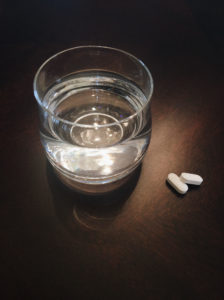I’ve been expressing my concerns about the impact of pain-relieving drugs on pregnant women and their unborn children, for a long time. What surprises me still is that the non-prescription medication paracetamol (acetaminophen, APAP) amongst others is currently recommended as a safe pain and fever treatment during pregnancy. However, a large number of studies suggest an association between APAP use in pregnancy and offspring neurodevelopment. All of these studies suggested an association between prenatal APAP exposure and the neurodevelopmental outcomes; ADHD, ASD, or lower IQ. Longer duration of APAP use was associated with increased risk. Associations were strongest for hyperactivity and attention-related outcomes. There is a recent 2018 study that looked at nine prospective cohort studies related to this topic affirming my concerns.
Here is another study published in JAMA Pediatrics that indicates that women who take acetaminophen (common brand names include Tylenol, Calpol, and Panadol) during pregnancy are more likely to have a child with attention deficit hyperactivity disorder (ADHD).1
Am I saying acetaminophen is the cause of ADHD?
No.
There are many driving factors that contribute to neurodevelopmental challenges. Let’s take a look at some of these acetaminophen studies now, and then let me explain how acetaminophen may contribute to ADHD and autism.
But everyone says they are safe!
Firstly, most people consider acetaminophen to be an extremely safe pain reliever for both children and adults. Pregnant women also take it assuming its safety. It’s certainly confusing particularly as there are a number of articles out there that surface and resurface which claim that there is literally nothing to fear from taking acetaminophen during pregnancy.
It’s pivotal we understand that assurances made, don’t always answer our specific safety questions.
Here’s what I mean when we look at blanket statements made about safety in pregnancy:
“Testing of acetaminophen safety in children did not include any evaluation of brain function, and no long-term studies were ever conducted. The primary manufacturer of acetaminophen in the US acknowledges that the drug has never been shown to be safe for brain development when used during pregnancy or in childhood. All safety tests were performed with the assumption that any side effects would be acute in nature (e.g., bleeding or acute organ damage). This assumption was based on observations made with acetaminophen in adults and with aspirin in children. It was not based on any experience with acetaminophen use in children.2″ William Parker, Associate Professor at Duke University,
I encourage you to dig deeper when reading about acetaminophen as there are studies using animal models (both in mice and in rats) that demonstrate that acetaminophen use during a sensitive period of brain development, causes long-term alterations in the brain and is manifested as problems with social function. There are (as of January 2017) a total of 8 published studies evaluating the long terms effects on children of acetaminophen use during pregnancy or during childhood. Two of these (one in 2014, one in 2016) were published in JAMA Pediatrics, one of the most highly respected pediatric journals. All studies point toward acetaminophen use being associated with long-term problems with neurological function highlighting that acetaminophen is neurotoxic to the developing brain.4,5
Researchers in the United Kingdom collected and analysed data 7,796 mothers along with their children to more closely assess the associations between maternal prenatal acetaminophen use and behavioural issues in their 7-year-old children. The data included acetaminophen use and behavioural assessments of the children.
Read here for the results
The data showed:4
- Prenatal acetaminophen use at 18 and 32 weeks of pregnancy was associated with a 42% increased risk of the child having conduct problems and hyperactivity symptoms,
- While maternal acetaminophen use at 32 weeks was also associated with a 29% increased risk of the child having emotional symptoms and a 46% increase in total behavioural difficulties.
- The researchers concluded “Children exposed to acetaminophen prenatally are at increased risk of multiple behavioural difficulties”
Acetaminophen is also the drug of choice for children to relieve a fever

Here’s my main concern with using these drugs during childhood:
Acetaminophen is very hard on the liver and reduces the livers store of the important detoxifying aid and antioxidant glutathione. Glutathione is as important to our cells for survival as oxygen, food or water.7
Glutathione, the MOTHER of all antioxidants (removes potentially damaging oxidizing agents in a living organism) and plays a primary role in the protection of all cells from daily metabolic stress, and toxic chemicals. Glutathione is also involved in detoxification, binding to toxins (heavy metals, solvents, and pesticides) and transforming them into a form that can be excreted by the body via urine or bile. Without glutathione we are vulnerable to oxidative stress keystone to many disorders associated with inflammation, leading to allergies and chronic disease. Glutathione is also the maestro of the immune system.
It is also important to understand that the brain also relies on glutathione to support development. Glutathione is its “fuel”. Without
Any factor that depletes glutathione potentially alters proper development.
In addition to acetaminophen, the following factors can deplete glutathione for anyone, not just our children:
- Toxins from poor diet
- Alcohol
- Pesticides
- Pollution
- Medications
- Stress
- Trauma
- Infections
- Acetone, cleaning solvents, paint removers
- Heavy metals (mercury, lead, cadmium, copper, etc.)
- X-rays UV radiation and electromagnetic fields
- Overtraining
- Lack of Sleep
Back to the Study:
My overall interpretation of this study and others is that depletion of glutathione caused by acetaminophen and analgesics in general, leaves cells, especially brain cells, susceptible to damage.
I think it won’t be long before we see a number of other future studies demonstrating more evidence of a link to ADHD, but additionally autism.
Read our follow up blog Why is Glutathione So Vital to learn more about glutathione and how to build your glutathione levels.
The Major Take Home Point:
Above and beyond it is important to appreciate that all symptoms arise for a reason. Pregnant or not, you’d agree that if you are in pain it makes sense to look for the cause of the irritation rather than simply masking it with a drug, right?
If you had a fire in your house you wouldn’t turn off the fire alarm without checking for a trigger.
This same
Likewise if your child has a fever or recurrent ear infections consider what might be causing them? The quality of our health is determined by the quality of questions we ask.
Our body gives us clues when it is moving out of balance and there are many holistic health practitioners who can help you look for the root cause of your pain or health challenge. Wellness chiropractors look for structural causes of pain and discomfort and can work with your masseur or yoga teacher if need be on how to re-balance and re-train the body. They can also work with Chinese Medicine practitioners or naturopaths if there are other underlying issues compromising your health.
In doing practitioners and body workers can help you address the real underlying cause of your pain and help move you towards fully strengthening your health or the health of your children.
Related Blogs:
How To Boost The Mother Of All Antioxidants
. . . . .
 Yours in Health,
Yours in Health,
Jennifer Barham-Floreani
(Bach. Chiropractic, Bach. App Clinical Science
Registered internationally, no longer practicing as a chiropractor in Australia.)
. . . . .
References:
1) Stergiakouli, E, Thapar, A, & Smith, GD (2016). Association of Acetaminophen Use During Pregnancy with Behavioral Problems in Childhood. Evidence Against Confounding. JAMA Pediatrics. Published online August 15, 2016. doi:10.1001/jamapediatrics.2016.1775
2) Parker, W(December 22, 2018). Tylenol Damages The Brains of Children, Research Reveals. https://www.greenmedinfo.com/blog/tylenol-damages-brains-children-research-reveals
3) Attarian, S, Tran, CH, Moore, A, Stanton, G, Meyer, E, & Moore,RP (June 2014). *The Neurodevelopmental Impact of Neonatal Morphine AdministrationBrain Sci. 2014 Jun; 4(2): 321–334.
4) Stergiakouli E, Thapar A, Smith GD. Association of Acetaminophen Use During Pregnancy with Behavioral Problems in Childhood. Evidence Against Confounding. JAMA Pediatrics. Published online August 15, 2016. doi:10.1001/jamapediatrics.2016.1775
5)Beale, DJ(April2017). Acetaminophen in Pregnancy and Adverse Childhood Neurodevelopment. April 2017. JAMA Pediatr. 2017;171(4):394-395. doi:10.1001/jamapediatrics.2016.5034
6) Sakulchit, T & Goldman, RD (March 2017). Acetaminophen use and asthma in children. Can Fam Physician. 2017 Mar; 63(3): 211–213.
7) Mirochnitchenko, O, Weisbrot-Lefkowitz, M‡§, et al(April 9, 1999). Acetaminophen Toxicity, Opposite Effects Of Two Forms Of Glutathione Peroxidase*. Journal of Biological Chemistry. 274, 10349-10355. doi: 10.1074/jbc.274.15.10349
8) Bowers, K, Li, Q, Bressler, J, et al(June 2011). Glutathione pathway gene variation and risk of autism spectrum disorders. J Neurodev Disord. 2011 Jun; 3(2): 132–143.
9) Murray, M(February 13, 2019 ). New Study Links Acetaminophen (Tylenol) to Attention Deficit Disorder with Hyperactivity. GreenMediaInfo.com [Online:Available] https://www.greenmedinfo.com/blog/new-study-links-acetaminophen-tylenol-attention-deficit-disorder-hyperactivity




